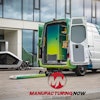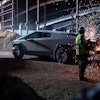DAKAR, Senegal (AP) — Intel, Motorola Solutions, HP and Apple have become "pioneers of progress" through their efforts to avoid purchasing minerals that fund armed groups in Central Africa, according to a report released Thursday.
The Enough Project ranked companies based on the steps they have taken to make sure their mobile phones, iPads and other gadgets aren't paying for the weapons used to terrorize Congolese civilians.
Congo is home to about 70 percent of the world's supply of coltan, a mineral needed in mobile phones, according to the U.S. Geological Survey. The vast country also has massive amounts of tin, gold, copper and cobalt.
While most of the companies had shown improvement since 2010, the Enough Project cited Nintendo in particular as trailing behind the rest of the industry when it comes to "conflict minerals."
Armed groups vying for control of these riches have used profits from illegal mining to purchase weapons used in gruesome attacks on civilians. In other cases, they have captured people and forced them to do the digging.
"The exploitation of Congo's mineral resources continues to exacerbate conflict and instability on the ground and consumers are still largely in the dark as to whether or not their products are conflict free," the report said.
"It will take a holistic effort by multiple governments and industries to regulate the flow of illegal conflict minerals. The driver of that effort must remain the demand of the conscious consumer."
Thursday's report comes just days before a key development is expected on the issue. U.S. legislation passed in July 2010 required American companies using tungsten, tin, tantalum and gold to reveal their supply chains in an effort to avoid using conflict minerals.
However, the law has not been fully implemented yet because the rules on how the law should be applied haven't yet been drafted by the Securities and Exchange Commission. The SEC is due to vote on those final regulations Aug. 22.
Even though that law is not yet in effect, the Enough Project said its existence already had helped propel many companies to take action.
The Washington-based group praised Intel for its pledge to produce a conflict-free microprocessing chip by 2013, becoming the first company to publicly commit to such a deadline.
It also singled out HP as "the most active corporate participant in a diplomacy work group on Congo."
And the Enough Project also gave high points to Philips, ACER, Dell and Microsoft, but described other companies as "laggards."
"Despite growing public awareness about this issue and significant industry movement, Nintendo has made no known effort to trace or audit its supply chain," the report said. "Sharp, HTC, Nikon, and Canon are taking initial steps to join industry efforts, but their progress remains far behind industry leaders."
There was no immediate comment from the companies on the report, which was released before their offices opened on the U.S. West Coast.
The group said that it wanted the companies to know more about the origins of the minerals they were buying, but not to avoid buying from the country altogether.
"A handful of companies are helping Congo develop a clean trade, but some companies are taking a hands-off approach to instruct their suppliers to not buy minerals from Congo and the region. This approach helps cut off armed groups but leaves mining communities in Congo behind."
___
Associated Press writer Michelle Faul in Johannesburg contributed to this report.






















